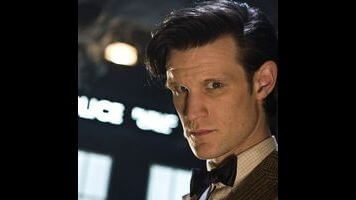Doctor Who: "The Doctor's Daughter"

Okay, the name's a bit of a fake-out, but we could have guessed that going in, right? Turns out that special guest star Georgia Moffett isn't exactly playing some long-lost lovechild, the product of a night of passion between The Doctor and a space maiden rescued from the clutch of the Daleks. Her relationship with the Doctor is much more recent, but arguably even closer. (The title's a bit of a play on words, too, since Moffett is the real-life daughter of Peter Davison who succeeded Tom Baker as the Fifth Doctor in 1981.) As one of our ahead-of-the-game commenters put it last week, she's not his daughter: she's his clone. I deleted that comment. No spoilers, please, for readers watching as we go. (Thanks!) But it's not that much of a spoiler since we find it out before the credits have even rolled.
With two companions in tow, both of whom take a moment to bask in the shared excitement of tooling around the galaxy with the Doctor, the TARDIS lands in another grim land in the midst of a war-with-no-apparent end. Catching a "not processed" wanderer, a party of one of the planet's warring factions grabs the Doctor's hand and inserts it into a device apparently on loan from Dune. The result: Instant Doctor Daughter.
If I were a nitpickier viewer I'd probably dwell on the fact that Moffett neither looks nor acts anything like Tennant. And if I were an even nitpickier reader I'd probably respond by pointing out that she could just be manifesting latent Fifth Doctor genes. I don't want to worry about that too much, however, since Moffett's pretty charming as Jenny, short for "generated anomaly," and she does capture the enthusiasm we might expect from a Doctor clone. My biggest problem with the character is that we only really get an impression of her. She's not there. Then she's there for a bit with a tiny bit of character development. Then she's gone. (Sort of; I'd be surprised if that's the last we see of Jenny.)
But if Jenny's character lacks some depth, her appearance reveals depth in others. Tennant's in fine form this outing, tapping into the usually obscured tragedy and sadness that drives The Doctor. We get some more hints of what's happened to shape him and form his repulsion for killing when he reluctantly talks about his war experience and the losses he's suffered over time. It's a side of the character we don't see that often and then usually only in glimpses, but it says a lot. The Doctor's a bit like a mirror image of William Munny in Unforgiven or Jimmy Ringo in The Gunfighter. Where the pasts that haunt those men led them to retreat from the world, The Doctor has charged himself with exploring and improving the universe, constructing his pacifist ideals in opposition to his experiences.